Eurovision Song Contest 2008
The Eurovision Song Contest 2008 was the 53rd edition of the annual Eurovision Song Contest. It took place in Belgrade, Serbia, following Marija Šerifović's win at the 2007 contest in Helsinki, Finland with the song "Molitva". It was the first time Serbia had hosted the contest - only 1 year after the country made its debut as an independent nation. Organised by the European Broadcasting Union (EBU) and host broadcaster Radio Television of Serbia (RTS), the contest was held at the Belgrade Arena, and (for the first time) consisted of two semi-finals on 20 and 22 May, and the grand final on 24 May 2008. The three live shows were hosted by Jovana Janković and Željko Joksimović.[4] It was the first Eurovision Song Contest held in a former Yugoslav republic with the 1990 contest in Zagreb being held before the dissolution of the country.
| Eurovision Song Contest 2008 | |
|---|---|
| Confluence of Sound | |
 | |
| Dates | |
| Semi-final 1 | 20 May 2008 |
| Semi-final 2 | 22 May 2008 |
| Grand final | 24 May 2008 |
| Host | |
| Venue | Belgrade Arena Belgrade, Serbia |
| Presenter(s) | |
| Directed by | Sven Stojanović |
| Executive supervisor | Svante Stockselius |
| Executive producer | Sandra Šuša |
| Host broadcaster | Radio Television of Serbia (RTS) |
| Opening act |
|
| Interval act |
|
| Website | eurovision |
| Participants | |
| Number of entries | 43 |
| Debuting countries | |
| Returning countries | None |
| Non-returning countries | |
Participation map
| |
| Vote | |
| Voting system | Each country awarded 12, 10, 8–1 points to their 10 favourite songs. |
| Nul points | None |
| Winning song | |
Forty-three countries participated in the contest,[5] beating the record of forty-two set the year before.[6] Azerbaijan and San Marino[7] participated for the first time, while Austria did not return, mainly due to questions on the semi-final organisation, and the politicization of the contest.[8]
The winner was Russia with the song "Believe", performed by Dima Bilan who wrote it with Jim Beanz. This was Russia's first victory in the contest, and the third year finishing in the top three. Ukraine, Greece, Armenia and Norway rounded out the top five. Armenia achieved their best result to date in this edition. Of the "Big Four" countries Spain placed the highest, finishing sixteenth, while the United Kingdom ended up in last place for the second time in their Eurovision history, after 2003.
The official website, eurovision.tv, streamed national finals for this year's contest live on ESCTV for the first time.[9] Furthermore, for the first time the winner has been awarded an official winner's trophy of the Eurovision Song Contest. The trophy is a handmade piece of sandblasted glass in the shape of a 1950s microphone.[10][11]
Location

Venue
Serbia gained the right to host the Contest after Marija Šerifović won the 2007 Contest in Helsinki, Finland. Since Serbia was the winner of the preceding contest, the 2008 contest was subsequently held there. The Belgrade Arena in Belgrade was chosen as the venue for the contest,[12] and is among the largest indoor arenas in Europe, with a total capacity of 25,000 seats.
On 14 September 2007, the Mayor of Helsinki handed over the "Eurovision keys" to the Deputy of Belgrade. This ceremony is meant to be a tradition from the 2008 contest and onward, and the ring contains a key from every city that has ever hosted the competition.[13]
Potential change of location
Following the unilateral Kosovo declaration of independence from Serbia on 17 February 2008, which has resulted in protests and unrest across the country, the location of the event was considered to be changed.[14] Ukraine was considered an option since they came second in Eurovision Song Contest 2007. YLE were another option, as they hosted the previous year's competition in Helsinki, Finland.[15] Greece's Ellinikí Radiofonía Tileórasi (ERT) also offered the EBU to host the contest in Athens, Greece again.[16] It was later decided that the contest would stay in Belgrade, with the EBU giving support. RTS would gain a guarantee of safety and security from the government of Serbia for all visitors and participants of the contest.[14] The delegations of Albania, Croatia and Israel had special security.[17] In the end, the contest was held without any incidents.[14][17]
Visual design
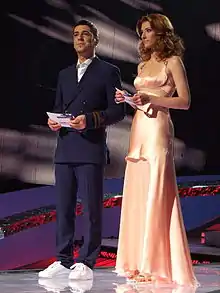
RTS ran a competition that led to the creation of the 2008 Contest's branding, logo and the stage.[18] The theme of the Contest was based around the "confluence of sound". This was symbolic as Belgrade lies on the confluence of two European rivers, the Sava and Danube. The logo chosen, a treble clef, formed the graphical basis of the design created by Boris Miljković.[19]
The postcards in the first and second semi-final were based around the creation of the flag of the nation that was to perform next. Each post card had a short story related to each country and its people. During each postcard a short letter was displayed. All were in the national language of the artist's country, with the exception of the Serbian postcard, which consisted of "Welcome to Belgrade" and "Welcome to Serbia" in various languages and the Belgian postcard which was written in the constructed language the Belgian group performed in. The postcards were brought to an end by a stamp with this year's Eurovision logo.
According to RTS the stage represented native identities, history and modern themes, symbols and universally recognised messages. The confluence-themed stage also contained a large number of television and LCD display screens. The stage had settings for all new electronic possibilities including some movable parts of the stage.[20] It was designed by Chicago-based David Cushing.
The first semi-final was created around a city theme. The contest opened with a panorama of the city of Belgrade forming in the stage's background with two waves sliding down the stage to meet in the centre – at the confluence, the overall theme of the contest.
The second semi-final was based around the theme of water, which was enhanced by the look of the stage during the interval act where the water formed the main colours of the stage.
The grand final was based on the theme of the confluence. Construction of the stage lasted several days and was carried out by various teams from across Europe. Pyrotechnics were heavily used for the entries from Armenia, Azerbaijan, Finland, Germany, Turkey, the Czech Republic, Bulgaria and Switzerland. The stage received positive feedback from the media and fans describing it as "one of the best looking stages in the history of the competition".
Format

At a press conference in Helsinki in May 2007, Svante Stockselius, executive supervisor of the Contest for the EBU, announced that the competition's format may be expanded to two semi-finals in 2008 or 2009.[21] On 28 September 2007 it was announced that the EBU had approved the plan of hosting two semi-finals in 2008.[22]
Based on research conducted by the EBU's tele-voting partner Digame, the semi-finalists were sorted into the two heats through the drawing of lots, which was seeded to keep countries that have a significant history of voting for each other apart. Each broadcaster had to broadcast the semi-final in which they took part, with the broadcasting of the other semi-final being optional. The draw for the semi-final allocation occurred in the City Assembly of Belgrade on Monday 28 January 2008 at 13:00 CET and was conducted by the hosts of the contest Jovana Janković and Željko Joksimović.
First, two envelopes with 'Semi-Final 1' and 'Semi-Final 2' were drawn. Then, three countries from each pot were chosen randomly to take part in the first semi-final and the other three in the second one. The country left in Pot 5 took part in the first envelope that is drawn. While, the country left in Pot 6 in the second one.[23]
The automatic grand finalist countries chose whether they would broadcast both semi-finals or just one, but viewers from these countries could only vote in one. From the draw conducted, it was decided which of the five grand finalist countries would broadcast and have voting rights in either of the events. The semi-finals were webcast live through Eurovision.tv.[24] The top nine songs from the televoting qualified for the grand final, and a tenth was determined by the back-up juries. Twenty-five songs competed in the grand final.[25]
Semi-final allocation
On 24 January 2008, all 38 countries in the semi-finals were separated into the following pots based on voting history and geographical location:
| Pot 1 | Pot 2 | Pot 3 | Pot 4 | Pot 5 | Pot 6 |
|---|---|---|---|---|---|
Running order
The draw to decide the running order of the songs in each semi-final and the grand final was conducted at the Heads of Delegation meeting on 17 March 2008.[26]
Participating countries
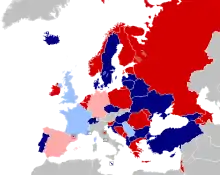
On 21 December 2007, the EBU confirmed that 43 countries would be present in Belgrade.[27] San Marino, as well as the newest EBU member, Azerbaijan, made its debut at the 2008 contest. Austria did not compete; its broadcaster, ORF, said "we've already seen in 2007 that it's not the quality of the song, but the country of origin that determines the decision."[8] Italy, which had not competed since 1997, and which would have been an automatic finalist, was again absent. Slovakia was absent due to budget problems.
The following countries competed in two semi-finals which were broadcast live on Tuesday 20 May and Thursday 22 May 2008. In addition to this, automatic grand finalists Germany and Spain exercised voting rights at the first semi-final. France, the United Kingdom and Serbia exercised voting rights at the second semi-final. Spain and France each broadcast only the semi-final in which they participated; Germany, Serbia and the UK screened both semi-finals (with Germany broadcasting on a delay).
Results
Semi-final 1
- The first semi-final was held on 20 May 2008.
- Germany and Spain voted in this semi-final.
- Pale turquoise denotes the entry chosen by the jury to go to the grand final.
Semi-final 2
- The second semi-final was held on 22 May 2008
- The United Kingdom, France and Serbia voted in this semi-final.
- Pale turquoise denotes the entry chosen by the jury to go to the grand final.
Grand final
The grand finalists were:
- the big four France, Germany, Spain and the United Kingdom
- the host country Serbia
- the top nine countries from the first semi-final plus one wildcard from the juries (marked in pale turquoise)
- the top nine countries from the second semi-final plus one wildcard from the juries (marked in pale turquoise)
The grand final was held on 24 May 2008 and was won by Russia.
Voting during the grand final
The voting order and spokespersons during the grand final were as follows:[30]
 United Kingdom – Carrie Grant[31]
United Kingdom – Carrie Grant[31]
(UK representative in the 1983 Contest as part of Sweet Dreams) Macedonia – Ognen Janeski[32]
Macedonia – Ognen Janeski[32] Ukraine – Marysya Horobets
Ukraine – Marysya Horobets Germany – Thomas Hermanns[33]
Germany – Thomas Hermanns[33] Estonia – Sahlene[34]
Estonia – Sahlene[34]
(Estonian representative in the 2002 Contest)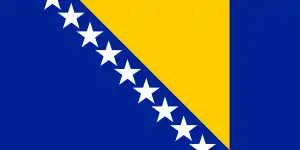 Bosnia and Herzegovina – Melina Garibović[35]
Bosnia and Herzegovina – Melina Garibović[35] Albania – Leon Menkshi
Albania – Leon Menkshi.svg.png.webp) Belgium – Sandrine van Handenhoven[36]
Belgium – Sandrine van Handenhoven[36].svg.png.webp) San Marino – Roberto Moretti
San Marino – Roberto Moretti Latvia – Kristīne Virsnīte[37]
Latvia – Kristīne Virsnīte[37] Bulgaria – Valentina Voykova
Bulgaria – Valentina Voykova.svg.png.webp) Serbia – Dušica Spasić[38]
Serbia – Dušica Spasić[38] Israel – Noa Barak-Weshler
Israel – Noa Barak-Weshler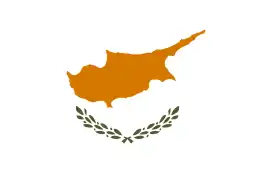 Cyprus – Hristina Marouhou[39]
Cyprus – Hristina Marouhou[39]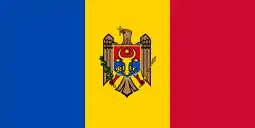 Moldova – Vitalie Rotaru
Moldova – Vitalie Rotaru Iceland – Brynja Þorgeirsdóttir
Iceland – Brynja Þorgeirsdóttir France – Cyril Hanouna[40]
France – Cyril Hanouna[40] Romania – Alina Sorescu
Romania – Alina Sorescu Portugal – Sabrina[41]
Portugal – Sabrina[41]
(Portuguese representative in the 2007 Contest) Norway – Stian Barsnes Simonsen
Norway – Stian Barsnes Simonsen
(Co-Presenter of the Junior Eurovision Song Contest 2004) Hungary – Éva Novodomszky
Hungary – Éva Novodomszky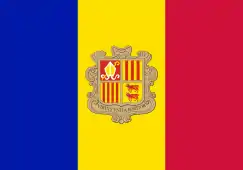 Andorra – Alfred Llahí
Andorra – Alfred Llahí Poland – Radek Brzózka[42]
Poland – Radek Brzózka[42] Slovenia – Peter Poles[43]
Slovenia – Peter Poles[43]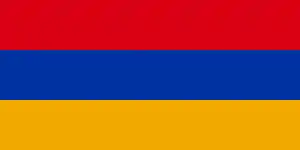 Armenia – Hrachuhi Utmazyan
Armenia – Hrachuhi Utmazyan Czech Republic – Petra Šubrtová
Czech Republic – Petra Šubrtová Spain – Ainhoa Arbizu[44]
Spain – Ainhoa Arbizu[44] Netherlands – Esther Hart[45]
Netherlands – Esther Hart[45]
(Dutch representative in the 2003 Contest) Turkey – Meltem Ersan Yazgan[46]
Turkey – Meltem Ersan Yazgan[46] Malta – Moira Delia[47]
Malta – Moira Delia[47]
(Presenter of the Junior Eurovision Song Contest 2014) Ireland – Niamh Kavanagh[48]
Ireland – Niamh Kavanagh[48]
(Winner of the 1993 and representative in the 2010 Contest)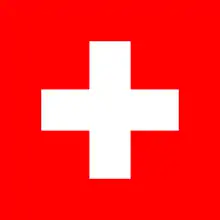 Switzerland – Cécile Bähler[49]
Switzerland – Cécile Bähler[49] Azerbaijan – Leyla Aliyeva[50]
Azerbaijan – Leyla Aliyeva[50]
(Co-Presenter of the 2012 Contest) Greece – Alexis Kostalas[51]
Greece – Alexis Kostalas[51] Finland – Mikko Leppilampi[52]
Finland – Mikko Leppilampi[52]
(Co-Presenter of the 2007 Contest) Croatia – Barbara Kolar
Croatia – Barbara Kolar Sweden – Björn Gustafsson[53]
Sweden – Björn Gustafsson[53].svg.png.webp) Belarus – Olga Barabanschikova
Belarus – Olga Barabanschikova Lithuania - Rolandas Vilkončius
Lithuania - Rolandas Vilkončius Russia – Oxana Fedorova
Russia – Oxana Fedorova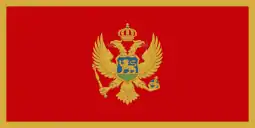 Montenegro – Nina Radulović[38]
Montenegro – Nina Radulović[38] Georgia – Tika Patsatsia[54]
Georgia – Tika Patsatsia[54] Denmark – Maria Montell
Denmark – Maria Montell
Scoreboards
Semi-final 1
| Voting procedure used: 100% Televoting 100% Jury vote |
Televoting Results | ||||||||||||||||||||||
|---|---|---|---|---|---|---|---|---|---|---|---|---|---|---|---|---|---|---|---|---|---|---|---|
| Montenegro | 23 | 1 | 10 | 12 | |||||||||||||||||||
| Israel | 104 | 5 | 2 | 7 | 10 | 4 | 10 | 4 | 7 | 5 | 7 | 6 | 10 | 6 | 8 | 5 | 4 | 4 | |||||
| Estonia | 8 | 1 | 7 | ||||||||||||||||||||
| Moldova | 36 | 5 | 5 | 1 | 6 | 10 | 5 | 4 | |||||||||||||||
| San Marino | 5 | 2 | 3 | ||||||||||||||||||||
| Belgium | 16 | 6 | 10 | ||||||||||||||||||||
| Azerbaijan | 96 | 3 | 5 | 4 | 10 | 5 | 10 | 5 | 8 | 3 | 2 | 4 | 5 | 7 | 10 | 7 | 8 | ||||||
| Slovenia | 36 | 10 | 2 | 2 | 1 | 2 | 10 | 4 | 1 | 2 | 2 | ||||||||||||
| Norway | 106 | 4 | 6 | 8 | 3 | 7 | 1 | 7 | 2 | 7 | 8 | 10 | 4 | 8 | 5 | 12 | 4 | 7 | 1 | 2 | |||
| Poland | 42 | 10 | 3 | 2 | 12 | 1 | 2 | 3 | 1 | 5 | 3 | ||||||||||||
| Ireland | 22 | 1 | 3 | 7 | 4 | 1 | 2 | 1 | 2 | 1 | |||||||||||||
| Andorra | 22 | 4 | 3 | 1 | 1 | 1 | 12 | ||||||||||||||||
| Bosnia and Herzegovina | 72 | 12 | 1 | 6 | 4 | 12 | 12 | 3 | 7 | 8 | 7 | ||||||||||||
| Armenia | 139 | 6 | 10 | 2 | 5 | 8 | 12 | 5 | 3 | 12 | 2 | 3 | 6 | 12 | 4 | 5 | 12 | 12 | 10 | 10 | |||
| Netherlands | 27 | 1 | 3 | 8 | 2 | 7 | 3 | 3 | |||||||||||||||
| Finland | 79 | 2 | 12 | 8 | 4 | 2 | 3 | 6 | 5 | 6 | 12 | 1 | 4 | 6 | 2 | 6 | |||||||
| Romania | 94 | 8 | 12 | 6 | 6 | 6 | 6 | 5 | 3 | 7 | 6 | 5 | 3 | 1 | 1 | 8 | 3 | 8 | |||||
| Russia | 135 | 8 | 12 | 10 | 7 | 3 | 8 | 7 | 8 | 8 | 4 | 4 | 7 | 12 | 2 | 6 | 8 | 10 | 6 | 5 | |||
| Greece | 156 | 7 | 7 | 5 | 4 | 12 | 10 | 12 | 8 | 4 | 6 | 10 | 5 | 8 | 10 | 8 | 3 | 12 | 6 | 12 | 7 | ||
12 points
Below is a summary of all 12 points in the first semi-final:
| N. | Contestant | Voting nation |
|---|---|---|
| 5 | Armenia | Belgium, Greece, Netherlands, Poland, Russia |
| 4 | Greece | Azerbaijan, Germany, Romania, San Marino |
| 3 | Bosnia and Herzegovina | Montenegro, Norway, Slovenia |
| 2 | ||
| Russia | Armenia, Israel | |
| Finland | Andorra, Estonia | |
| 1 | ||
| Andorra | Spain | |
| Montenegro | Bosnia and Herzegovina | |
| Norway | Finland | |
| Poland | Ireland | |
| Romania | Moldova |
Semi-final 2
| Voting procedure used: 100% Televoting |
Televoting Results | |||||||||||||||||||||||
|---|---|---|---|---|---|---|---|---|---|---|---|---|---|---|---|---|---|---|---|---|---|---|---|---|
| Iceland | 68 | 10 | 3 | 1 | 2 | 5 | 4 | 1 | 2 | 10 | 7 | 5 | 1 | 5 | 8 | 4 | ||||||||
| Sweden | 54 | 8 | 2 | 3 | 1 | 3 | 12 | 1 | 7 | 4 | 3 | 1 | 3 | 6 | ||||||||||
| Turkey | 85 | 6 | 5 | 12 | 7 | 3 | 7 | 8 | 5 | 4 | 8 | 10 | 10 | |||||||||||
| Ukraine | 152 | 6 | 3 | 12 | 7 | 1 | 12 | 12 | 6 | 7 | 12 | 7 | 12 | 8 | 8 | 10 | 6 | 12 | 3 | 8 | ||||
| Lithuania | 30 | 12 | 10 | 8 | ||||||||||||||||||||
| Albania | 67 | 1 | 7 | 8 | 3 | 10 | 1 | 5 | 10 | 12 | 2 | 5 | 3 | |||||||||||
| Switzerland | 47 | 10 | 5 | 5 | 12 | 7 | 1 | 7 | ||||||||||||||||
| Czech Republic | 9 | 1 | 2 | 1 | 5 | |||||||||||||||||||
| Belarus | 27 | 10 | 6 | 5 | 4 | 2 | ||||||||||||||||||
| Latvia | 86 | 7 | 8 | 2 | 12 | 5 | 6 | 6 | 1 | 6 | 6 | 6 | 4 | 10 | 2 | 5 | ||||||||
| Croatia | 112 | 4 | 4 | 5 | 7 | 5 | 3 | 6 | 3 | 7 | 7 | 6 | 3 | 8 | 10 | 6 | 10 | 6 | 2 | 10 | ||||
| Bulgaria | 56 | 5 | 6 | 6 | 1 | 2 | 2 | 1 | 1 | 3 | 2 | 8 | 7 | 1 | 6 | 5 | ||||||||
| Denmark | 112 | 12 | 12 | 4 | 8 | 4 | 5 | 10 | 4 | 8 | 3 | 2 | 3 | 12 | 4 | 5 | 3 | 8 | 4 | 1 | ||||
| Georgia | 107 | 2 | 1 | 10 | 12 | 10 | 8 | 10 | 10 | 4 | 2 | 10 | 12 | 2 | 7 | 7 | ||||||||
| Hungary | 6 | 1 | 1 | 4 | ||||||||||||||||||||
| Malta | 38 | 3 | 8 | 6 | 4 | 4 | 3 | 4 | 4 | 2 | ||||||||||||||
| Cyprus | 36 | 4 | 2 | 2 | 8 | 2 | 5 | 1 | 12 | |||||||||||||||
| Macedonia | 64 | 2 | 7 | 7 | 8 | 4 | 12 | 10 | 2 | 12 | ||||||||||||||
| Portugal | 120 | 10 | 5 | 8 | 4 | 6 | 12 | 7 | 8 | 3 | 8 | 5 | 7 | 6 | 3 | 3 | 12 | 6 | 7 | |||||
12 points
Below is a summary of all 12 points in the second semi-final:
| N. | Contestant | Voting nation |
|---|---|---|
| 6 | Ukraine | Belarus, Bulgaria, Czech Republic, Georgia, Portugal, Turkey |
| 3 | Denmark | Hungary, Iceland, Sweden |
| 2 | ||
| Georgia | Cyprus, Ukraine | |
| Macedonia | Croatia, Serbia | |
| Portugal | France, Switzerland | |
| 1 | ||
| Albania | Macedonia | |
| Cyprus | United Kingdom | |
| Latvia | Lithuania | |
| Lithuania | Latvia | |
| Sweden | Denmark | |
| Switzerland | Malta | |
| Turkey | Albania |
Grand final
| Voting procedure used: 100% Televoting 100% Jury vote |
Televoting Results | ||||||||||||||||||||||||||||||||||||||||||||
|---|---|---|---|---|---|---|---|---|---|---|---|---|---|---|---|---|---|---|---|---|---|---|---|---|---|---|---|---|---|---|---|---|---|---|---|---|---|---|---|---|---|---|---|---|---|
| Romania | 45 | 1 | 6 | 3 | 12 | 4 | 4 | 12 | 3 | ||||||||||||||||||||||||||||||||||||
| United Kingdom | 14 | 6 | 8 | ||||||||||||||||||||||||||||||||||||||||||
| Albania | 55 | 12 | 1 | 3 | 4 | 1 | 8 | 1 | 10 | 8 | 7 | ||||||||||||||||||||||||||||||||||
| Germany | 14 | 12 | 2 | ||||||||||||||||||||||||||||||||||||||||||
| Armenia | 199 | 1 | 7 | 6 | 6 | 2 | 12 | 8 | 8 | 5 | 8 | 10 | 2 | 1 | 12 | 4 | 12 | 5 | 12 | 10 | 12 | 10 | 12 | 2 | 7 | 12 | 1 | 12 | |||||||||||||||||
| Bosnia and Herzegovina | 110 | 5 | 5 | 12 | 2 | 10 | 10 | 1 | 7 | 6 | 2 | 7 | 3 | 6 | 12 | 10 | 10 | 2 | |||||||||||||||||||||||||||
| Israel | 124 | 5 | 3 | 5 | 4 | 5 | 10 | 2 | 7 | 2 | 6 | 6 | 6 | 3 | 3 | 5 | 3 | 6 | 3 | 1 | 7 | 1 | 8 | 2 | 4 | 3 | 6 | 5 | 3 | ||||||||||||||||
| Finland | 35 | 10 | 1 | 7 | 4 | 4 | 2 | 7 | |||||||||||||||||||||||||||||||||||||
| Croatia | 44 | 2 | 1 | 2 | 10 | 5 | 3 | 1 | 3 | 8 | 2 | 3 | 1 | 2 | 1 | ||||||||||||||||||||||||||||||
| Poland | 14 | 4 | 10 | ||||||||||||||||||||||||||||||||||||||||||
| Iceland | 64 | 6 | 2 | 4 | 7 | 8 | 4 | 6 | 7 | 8 | 12 | ||||||||||||||||||||||||||||||||||
| Turkey | 138 | 8 | 7 | 4 | 10 | 8 | 10 | 10 | 4 | 5 | 10 | 8 | 2 | 5 | 10 | 6 | 12 | 4 | 3 | 2 | 6 | 4 | |||||||||||||||||||||||
| Portugal | 69 | 3 | 4 | 6 | 5 | 1 | 6 | 8 | 10 | 8 | 5 | 10 | 3 | ||||||||||||||||||||||||||||||||
| Latvia | 83 | 10 | 7 | 4 | 8 | 2 | 3 | 2 | 7 | 12 | 4 | 3 | 10 | 3 | 2 | 6 | |||||||||||||||||||||||||||||
| Sweden | 47 | 2 | 3 | 2 | 1 | 1 | 3 | 7 | 1 | 1 | 12 | 5 | 1 | 8 | |||||||||||||||||||||||||||||||
| Denmark | 60 | 3 | 3 | 2 | 7 | 12 | 5 | 12 | 2 | 2 | 4 | 1 | 5 | 2 | |||||||||||||||||||||||||||||||
| Georgia | 83 | 8 | 5 | 8 | 2 | 7 | 3 | 1 | 10 | 4 | 4 | 5 | 4 | 4 | 6 | 5 | 7 | ||||||||||||||||||||||||||||
| Ukraine | 230 | 5 | 4 | 4 | 3 | 8 | 1 | 10 | 7 | 6 | 10 | 6 | 7 | 5 | 3 | 12 | 6 | 6 | 10 | 2 | 5 | 8 | 7 | 8 | 10 | 6 | 10 | 6 | 3 | 7 | 10 | 6 | 8 | 4 | 10 | 7 | |||||||||
| France | 47 | 2 | 6 | 3 | 8 | 1 | 3 | 1 | 4 | 2 | 4 | 8 | 5 | ||||||||||||||||||||||||||||||||
| Azerbaijan | 132 | 8 | 10 | 1 | 7 | 4 | 3 | 3 | 8 | 2 | 12 | 7 | 7 | 1 | 10 | 2 | 12 | 3 | 8 | 7 | 10 | 7 | |||||||||||||||||||||||
| Greece | 218 | 12 | 3 | 2 | 12 | 1 | 7 | 12 | 8 | 12 | 10 | 8 | 5 | 12 | 4 | 3 | 12 | 8 | 8 | 3 | 6 | 8 | 5 | 3 | 6 | 7 | 2 | 4 | 5 | 6 | 5 | 1 | 2 | 3 | 6 | 4 | 3 | ||||||||
| Spain | 55 | 1 | 1 | 4 | 4 | 5 | 10 | 12 | 1 | 3 | 4 | 8 | 1 | 1 | |||||||||||||||||||||||||||||||
| Serbia | 160 | 10 | 8 | 12 | 5 | 4 | 5 | 1 | 2 | 7 | 7 | 6 | 7 | 4 | 12 | 3 | 6 | 8 | 1 | 12 | 2 | 5 | 10 | 6 | 1 | 4 | 12 | ||||||||||||||||||
| Russia | 272 | 6 | 12 | 7 | 12 | 4 | 6 | 3 | 12 | 6 | 10 | 12 | 8 | 10 | 1 | 10 | 6 | 5 | 10 | 5 | 6 | 7 | 12 | 7 | 5 | 1 | 5 | 8 | 5 | 8 | 7 | 10 | 6 | 12 | 12 | 8 | 8 | ||||||||
| Norway | 182 | 7 | 6 | 8 | 2 | 7 | 2 | 7 | 6 | 1 | 4 | 7 | 5 | 10 | 5 | 2 | 4 | 1 | 8 | 7 | 6 | 4 | 2 | 3 | 7 | 5 | 2 | 12 | 1 | 12 | 5 | 4 | 5 | 5 | 10 | ||||||||||
| Vertically, the table is ordered by appearance in the grand final. Horizontally, the table is ordered by voting order. | |||||||||||||||||||||||||||||||||||||||||||||
12 points
Below is a summary of all 12 points in the grand final:
| N. | Contestant | Voting nation |
|---|---|---|
| 8 | Armenia | Belgium, Czech Republic, France, Georgia, Greece, Netherlands, Poland, Russia |
| 7 | Russia | Armenia, Belarus, Estonia, Israel, Latvia, Lithuania, Ukraine |
| 6 | Greece | Albania, Cyprus, Germany, Romania, San Marino, United Kingdom |
| 4 | Serbia | Bosnia and Herzegovina, Montenegro, Slovenia, Switzerland |
| 2 | Azerbaijan | Hungary, Turkey |
| Bosnia and Herzegovina | Croatia, Serbia | |
| Denmark | Iceland, Norway | |
| Norway | Finland, Sweden | |
| Romania | Moldova, Spain | |
| 1 | Albania | Macedonia |
| Germany | Bulgaria | |
| Iceland | Denmark | |
| Latvia | Ireland | |
| Spain | Andorra | |
| Sweden | Malta | |
| Turkey | Azerbaijan | |
| Ukraine | Portugal |
Other Awards
Marcel Bezençon Awards
The Marcel Bezençon Awards were first handed out during the Eurovision Song Contest 2002 in Tallinn, Estonia honoring the best competing songs in the grand final. Founded by Christer Björkman (Sweden's representative in the 1992 Eurovision Song Contest and current Head of Delegation for Sweden) and Richard Herrey (member of the Herreys, Eurovision Song Contest 1984 winner from Sweden), the awards are named after the creator of the annual competition, Marcel Bezençon.[55] For the only time, the awards were divided into 4 categories; Press Award; Poplight Fan Award; Artistic Award; and Composer Award.[56]
| Category | Country | Song | Performer(s) | Composer(s) | Final result | Points |
|---|---|---|---|---|---|---|
| Artists Award (Voted by previous winners) |
"Shady Lady" | Ani Lorak | Philipp Kirkorov, Dimitris Kontopoulos Karen Kavaleryan |
2nd | 230 | |
| Composer Award | "Pe-o margine de lume" | Nico and Vlad | Andrei Tudor Andreea Andrei, Adina Şuteu |
20th | 45 | |
| Poplight Fan Award (voted by fans on the Swedish website poplight.se)[57] |
"Qélé, Qélé" | Sirusho | H.A. Der-Hovagimian Sirusho |
4th | 199 | |
| Press Award | "Senhora do mar (Negras águas)" | Vânia Fernandes | Andrej Babić Carlos Coelho |
13th | 69 |
OGAE
Organisation Générale des Amateurs de l'Eurovision (more commonly known as OGAE) is an international organisation that was founded in 1984 in Savonlinna, Finland by Jari-Pekka Koikkalainen.[58] The organisation consists of a network of 40 Eurovision Song Contest fan clubs across Europe and beyond, and is a non-governmental, non-political, and non-profitable company.[59] In what has become an annual tradition for the OGAE fan clubs, a voting poll was opened allowing members from different clubs around the world to vote for their favourite songs of the 2008 contest. Below is the top five overall results, after all the votes had been cast.[60]
| Country | Song | Performer(s) | Composer(s) | OGAE result | Eurovision Ranking |
|---|---|---|---|---|---|
| "Hero" | Charlotte Perrelli | Bobby Ljunggren, Fredrik Kempe | 308 | 18th | |
| "Era stupendo" | Paolo Meneguzzi | Paolo Meneguzzi, Mattias Brånn, Vincenzo Incenzo | 216 | 13th in semi-final | |
| "Oro" | Jelena Tomašević feat. Bora Dugić | Željko Joksimović, Dejan Ivanović | 178 | 6th | |
| "This Is My Life" | Eurobandið | Örlygur Smári, Paul Oscar, Peter Fenner | 145 | 14th | |
| "Hold On Be Strong" | Maria Haukaas Storeng | Mira Craig | 145 | 5th | |
Barbara Dex Award
The Barbara Dex Award has been annually awarded by the fan website House of Eurovision since 1997, and is a humorous award given to the worst dressed artist each year in the contest. It is named after the Belgian artist, Barbara Dex, who came last in the 1993 contest, in which she wore her own self designed dress.
| Country | Song | Performer(s) | Composer(s) |
|---|---|---|---|
| "Casanova" | Gisela | Jordi Cubino |
Broadcasting
Semi-finals broadcasts
As stated above, a country only has to broadcast the grand final and the semi-final when it is one of the competitors or voters. The United Kingdom,[61] San Marino, Greece, Croatia,[62] Ireland, Germany,[63] the Netherlands,[64] Norway,[65] Malta,[66] Serbia,[67] Finland,[68] Bosnia and Herzegovina,[69] Denmark,[70] Portugal,[71] Cyprus,[72] Israel,[73] Estonia,[34] Turkey,[74] Latvia,[75] Slovenia,[76] Russia,[77] Ukraine,[78] Lithuania, the Czech Republic,[79] Andorra,[80] Albania,[81] Bulgaria, Iceland,[82] Sweden,[83] Romania[84] and Australia confirmed they would broadcast both semi-finals (some in delay and some live).
International broadcasts
.svg.png.webp) Australia
Australia- Although Australia was not eligible to enter, the contest was broadcast on SBS. The first semi-final was broadcast on Friday 23 May at 19:30 local time, with the second semi-final on Saturday 24 May 2008 at 19:30 local time, and the Final on Sunday 25 May 2008 at 19:30 local time,[85] amongst a weekend of Eurovision-themed programming.[86] SBS local host Julia Zemiro provided introductory and concluding segments with SBS otherwise broadcasting the BBC's coverage and commentary.[87] In recent years the contest has been one of SBS's highest-rating programmes in terms of viewer numbers.[88] The grand final rated well for SBS with 427,000 viewers tuning in for the grand final with 421,000 for the second semi-final and 272,000 for the first semi-final.[89]
 Austria
Austria- In Austria, ORF broadcast the contest live and received high TV ratings. However, it did not broadcast the semi-finals on 20 and 22 May, which Austrians were able to watch on German television via ARD stations instead.[90]
 Italy
Italy- No Italian broadcaster proper showed the contest, but San Marinese SMRTV, which broadcast live the full event on both TV and radio, is available in some parts of Italy: Romagna (and a small part of Emilia, including Bologna), northern Marche, and southern Veneto, including Venice.[91]
- Worldwide
- A live broadcast of the Eurovision Song Contest was available worldwide via satellite through European streams such as TVRi, ERT World, ARMTV, TVE Internacional, TRT International, TVP Polonia, RTP Internacional, RTS Sat and SVT Europa. The official Eurovision Song Contest website also provided a live stream without commentary via the peer to peer medium Octoshape.
High-definition broadcasts
RTS broadcast the event in 1080i high-definition (HD) and 5.1 Surround Sound. The new high-definition television system was in place at the Belgrade Arena by April 2008.[92] This is the second year that the event was broadcast live in HD. BBC HD broadcast the contest in High Definition in the United Kingdom. Swedish broadcaster SVT broadcast both the semi-final and the grand final on their HD-channel SVT HD. Lithuanian broadcaster LRT broadcast both the semi-final and the grand final in 1080i high-definition (HD) on their channel LTV. The same occurred on Swiss HD channel HD suisse; on this channel viewers were able to choose the language of the commentary while viewing a semi-final or grand final of the Eurovision Song Contest. However, all other countries broadcast the show only in standard definition, and the event will only be available to buy on a standard-definition DVD; it will not be released on HD-DVD or Blu-ray Disc.
Returning artists
| Artist | Country | Previous year(s) |
|---|---|---|
| Roberto Meloni (part of Pirates of the Sea) | 2007 (part of Bonaparti.lv) | |
| Dima Bilan | 2006 | |
| Gisela | 2002 (Backing vocalist and Dancer for Rosa and Spain) | |
| Charlotte Perrelli | 1999 (winner, as Charlotte Nilsson) |
Commentators
Most countries sent commentators to Belgrade or commentated from their own country, in order to add insight to the participants and, if necessary, provide voting information.
- Participating countries
The commentators of the 43 participating countries are as follows:
| Country | SF1 / SF2 / Final | Commentator(s) |
|---|---|---|
| All | Leon Menkshi (TVSH) | |
| All | Meri Picart (RTVA) | |
| Josep Lluís Trabal (RTVA) | ||
| All | Felix Khacatryan | |
| Hrachuhi Utmazyan | ||
| All | Isa Melikov (İctimai Televiziya və Radio Yayımları Şirkəti) | |
| Hüsniyyə Məhərrəmova (İctimai Televiziya və Radio Yayımları Şirkəti) | ||
| All | Denis Kurian (Belarus 1) | |
| Alexander Tikhanovich (Belarus 1) | ||
| All | Jean-Pierre Hautier (French, La Une) | |
| Jean-Louis Lahaye (French, La Une) | ||
| Patrick Duhamel (French, La Première) | ||
| Corinne Boulangier (French, La Première) | ||
| Bart Peeters (Dutch, één) | ||
| André Vermeulen (Dutch, één) | ||
| Michel Follet (Dutch, Radio 2) | ||
| Sven Pichal (Dutch, Radio 2) | ||
| All | Dejan Kukrić (BHT1) | |
| All | Elena Rosberg | |
| Georgi Kushvaliev | ||
| All | Duško Čurlić | |
| All | Melina Karageorgiou (RIK 1) | |
| All | Kateřina Kristelová (ČT1) | |
| All | Nikolaj Molbech (DR1) | |
| All | Marko Reikop | |
| All | Jaana Pelkonen (Finnish, YLE TV2) | |
| Mikko Peltola (Finnish, YLE TV2) | ||
| Asko Murtomäki (Finnish, YLE TV2) | ||
| Sanna Kojo (Finnish, YLE Radio Suomi) | ||
| Jorma Hietamäki (Finnish, YLE Radio Suomi) | ||
| Thomas Lundin (Swedish, YLE FST5) | ||
| SF2 | Peggy Olmi (France 4) | |
| Yann Renoard (France 4) | ||
| Final | Jean-Paul Gaultier (France 3) | |
| Julien Lepers (France 3) | ||
| François Kevorkian (France Bleu) | ||
| All | Bibi Kvachadze | |
| All | Peter Urban (Das Erste)[102] | |
| Tim Frühling (Hessischer Rundfunk)[103] | ||
| Thomas Mohr (NDR 2)[104] | ||
| All | Maggira Sisters (NET) | |
| Maria Kozakou (Second Programme)[106] | ||
| SF2 & Final | Gábor Gundel-Takács (M1) | |
| All | Sigmar Guðmundsson (Sjónvarpið) | |
| All | Marty Whelan (RTÉ One)[111][112] | |
| All | Larry Gogan (RTÉ Radio 1)[113] | |
| All | No commentator | |
| All | Kārlis Streips | |
| All | Darius Užkuraitis | |
| All | Milanka Rašik | |
| All | Eileen Montesin | |
| All | Lucia Danu | |
| Vitalie Rotaru | ||
| All | Dražen Bauković (TVCG2) | |
| Tamara Ivanković (TVCG2) | ||
| All | Cornald Maas (Nederland 1) | |
| All | Hanne Hoftun (NRK1) | |
| Per Sundnes (NRK1) | ||
| All | Artur Orzech (TVP1) | |
| All | Isabel Angelino (RTP1) | |
| All | Andreea Demirgian (TVR1) | |
| Leonard Miron (TVR1) | ||
| SF1 & Final | Dmitry Guberniev(Rossiya 1) | |
| Olga Shelest (Rossiya 1) | ||
| All | Gigi Restivo (SMRTV) | |
| Lia Fiorio (SMRTV) | ||
| All | Dragan Ilić (RTS1) | |
| Mladen Popović (RTS1) | ||
| All | Andrej Hofer | |
| SF1 & Final | José Luis Uribarri (La 1) | |
| Final | Carl Bildt (guest) (SVT1) | |
| All | Kristian Luuk and (SVT1) | |
| Josef Sterzenbach (SVT1) | ||
| Carolina Norén (SR P3)[124] | ||
| German | Patrick Hässig (First Semi-Final) and Sven Epiney (Second Semi-Final and Final) (SF zwei) | |
| French | Jean-Marc Richard & Nicolas Tanner (TSR 1) | |
| Italian | Sandy Altermatt (RSI La 2) | |
| All | Bülend Özveren (TRT 1) | |
| All | Timur Miroshnychenko (First National TV Channel) | |
| Semi-Finals | Paddy O'Connell (BBC Three) | |
| Caroline Flack (BBC Three) | ||
| Final | Terry Wogan (BBC One) | |
| Ken Bruce (BBC Radio 2) |
- Non-participating countries
The commentators of the non-participating countries are:
| Country | SF1/SF2/Final | Commentator(s) |
|---|---|---|
| All | Julia Zemiro (SBS) | |
| Final | Andi Knoll (ORF2) |
Official album
| Eurovision Song Contest: Belgrade 2008 | ||||
|---|---|---|---|---|
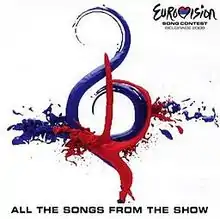 | ||||
| Compilation album by | ||||
| Released | 12 May 2008 | |||
| Genre | Pop | |||
| Length |
| |||
| Label | EMI, CMC | |||
| Eurovision Song Contest chronology | ||||
| ||||
Eurovision Song Contest: Belgrade 2008 was the official compilation album of the 2008 Contest, put together by the European Broadcasting Union and released by EMI Records and CMC International on 12 May 2008.The album featured all 43 songs that entered in the 2008 contest, including the semi-finalists that failed to qualify into the grand final.[130]
Charts
| Chart (2008) | Peak position |
|---|---|
| German Compilation Albums (Offizielle Top 100)[131] | 5 |
Notes
References
- "Ukrajinka digla Arenu na noge".
- "Počeo Eurosong: Đoković otvorio glasanje". RTV. 21 May 2008. Retrieved 26 May 2019.
- "ŠERIFOVIĆEVA I BREGOVIĆ U FINALU EVROVIZIJE". evropesma.org. 21 April 2008. Archived from the original on 28 May 2008. Retrieved 21 April 2008.
- "Jovana Janković & Željko Joksimović the hosts". Oikotimes.com. 4 March 2008. Archived from the original on 19 May 2011. Retrieved 4 March 2008.
- "43 Countries for Eurovision 2008". ESCToday.com. Retrieved 23 December 2007.
- "43 Countries for Eurovision 2008". ESCToday.com. Retrieved 23 December 2007.
- "San Marino in Belgrade confirmed". ESCToday.com. 21 November 2007. Retrieved 21 November 2007.
- "Austria will not go to Belgrade". ESCToday.com. 20 November 2007. Archived from the original on 21 November 2007. Retrieved 20 November 2007.
- "Revamped eurovision.tv site launched!". ESCToday.com. 15 January 2008. Retrieved 15 January 2008.
- "Trophy". Eurovision Song Contest. Retrieved 14 April 2020.
- "Eurovision Crystal Trophy". Kosta Boda. Retrieved 14 April 2020.
- "Welcome to Belgrade Arena". Eurovision.tv. 13 May 2007. Archived from the original on 23 November 2007. Retrieved 14 May 2007.
- "Belgrade received Helsinki city keys". Eurovision.tv. 14 September 2007. Archived from the original on 16 October 2007. Retrieved 19 September 2007.
- "The end of a decade: Belgrade 2008". eurovision.tv. 31 December 2009. Retrieved 6 April 2020.
- "Helsinki could host Eurovision again". ESCToday.com. 22 February 2008. Retrieved 22 February 2008.
- "WEBU holds phone conference to decide host city". Oikotimes. 2 February 2008. Archived from the original on 12 February 2010. Retrieved 22 February 2008.
- "2008. Beograd". evrovizija.rs. Retrieved 6 April 2020.
- "Serbia 2008: THE WINNER OF THE LOCAL OPEN COMPETITION FOR THE SUBLOGO – CODE MAMA 2008". RTS.co.yu. 5 July 2007. Retrieved 5 July 2007.
- "Izabran novi logo za "Evrosong" u Beogradu". blic.co.rs. 5 July 2007. Archived from the original on 3 July 2012. Retrieved 1 February 2008.
- "Eurovision 2008: Full stage image – The Sava, the Danube & Kalemegdan". ESCToday.com. 10 October 2007. Retrieved 10 October 2007.
- "Two semi finals in 2008". ESCToday.com. 31 July 2007. Retrieved 14 May 2007.
- "Eurovision: 2 semi finals confirmed!". ESCToday.com. 31 July 2007. Archived from the original on 11 October 2007. Retrieved 31 July 2007.
- "All you need to know for Monday's draw!". Eurovision.tv. Archived from the original on 27 January 2008. Retrieved 24 January 2008.
- "Svante Stockselius explains the new format". Oikotimes.com. Archived from the original on 22 November 2008. Retrieved 9 July 2007.
- "Eurovision 2008 – format confirmed!". ESCToday.com. Retrieved 24 November 2007.
- Sietse Bakker (17 March 2008). "Belgrade 2008: The running order!". Eurovision.tv. Archived from the original on 18 March 2008. Retrieved 18 March 2008.
- "43 Countries for Eurovision 2008". ESCToday.com. Retrieved 23 December 2007.
- "Eurovision Song Contest 2008". The Diggiloo Thrush. Retrieved 5 March 2012.
- https://eurovision.tv/event/belgrade-2008/second-semi-final/participants
- Floras, Stella (24 November 2009). "Tonight's voting order". ESCToday. Retrieved 29 November 2009.
- "Talking Shop: Carrie Grant". BBC News. 21 May 2008. Retrieved 21 May 2008.
- "ESCforum.net". ESCforum.net. Retrieved 9 August 2012.
- "Schräg und schrill: Das Grand Prix-Fieber kehrt zurück". quotenmeter.de. Retrieved 23 May 2008.
- "Estonia: Sahlene to be ETV's spokesperson". esctoday.com. Archived from the original on 18 October 2008. Retrieved 9 May 2008.
- "Laka u utrci za stari mikrofon". Archived from the original on 27 May 2008. Retrieved 25 May 2008.
- "Belgium: Sandrine to announce Belgian votes". Archived from the original on 26 April 2008. Retrieved 23 April 2008.
- "AKTUALITĀTES > Eirovīzijā triumfē Dima Bilans no Krievijas, Pirāti – vienpadsmitie / divpadsmitie". eirovizija.lv. Archived from the original on 12 June 2008. Retrieved 26 May 2008.
- "Sumnja od Jugolasvenskog glasanja". Evropesma.org. Archived from the original on 8 April 2012. Retrieved 9 August 2012.
- Savvidis, Christos (OGAE Cyprus)
- "Concours Eurovision de la Chanson • Consulter le sujet – Porte-paroles des jurys des pays francophones". Eurovision.vosforums.com. Retrieved 9 August 2012.
- "Sabrina to announce Portuguese votes". oikotimes.com. Archived from the original on 10 February 2010. Retrieved 3 April 2008.
- "Radek Brzózka przekaże głosy do Belgradu". Archived from the original on 1 May 2008. Retrieved 29 April 2008.
- "Slovenia: Rebeka danes na poti v Beograd (Rebeka will today go to Belgrade)". RTVSLO.SI. Retrieved 10 May 2008.
- "Uribarri vuelve a ser la voz de Eurovisión cuatro años después (Uribarri is the voice of Eurovision again after four years)". vertele.com. Archived from the original on 16 May 2008. Retrieved 13 May 2008.
- "Esther Hart, the new Dutch spokeswoman". esctoday.com. Retrieved 3 April 2008.
- "Ötesi final". Hürriyet. Retrieved 24 May 2008.
- https://web.archive.org/web/20160124012146/http://www.escflashmalta.com/index.php?option=com_content&view=article&id=1033%3Abreaking-news-and-the-spokesperson-is&catid=2%3Alatest-news-international&Itemid=2. Archived from the original on 24 January 2016. Retrieved 7 February 2016. Missing or empty
|title=(help) - "Quick update". allkindsofeverything.ie. 21 May 2008. Archived from the original on 11 August 2011. Retrieved 21 May 2008.
- "Details zur Sendung". sf.tv. Retrieved 9 May 2008.
- Floras, Stella (7 May 2008). "Azerbaijan: Azerbaijan: Elnur, Samir & Ruslana in Istanbul". ”ESCToday.com. Retrieved 22 June 2012.
- "Εκφωνητές της ΕΡΤ για τις ψήφους της Ελλάδας στην EUROVISION – Page 3". Retromaniax.gr. Archived from the original on 11 September 2012. Retrieved 9 August 2012.
- "Mikko and Jaana are back!". Retrieved 7 May 2008.
- "Björn Gustafsson to announce SVT viewers' vote". oikotimes.com. Archived from the original on 12 February 2010. Retrieved 24 May 2008.
- "Georgia: Tika Patsatsia spokesperson for 2008". esctoday.com. Archived from the original on 20 April 2008. Retrieved 17 April 2008.
- "Marcel Bezençon Award – an introduction". Poplight. Archived from the original on 17 October 2013. Retrieved 2 June 2009.
- "Winners of the Marcel Bezençon Awards 2012 | News | Eurovision Song Contest – Baku 2012". Eurovision.tv. Retrieved 9 August 2012.
- Viniker, Barry (11 March 2008). "Marcel Bezençon Award for fans". ESCToday. Retrieved 2 June 2009.
- "Eurovision Fanclub Network". OGAE. Retrieved 15 June 2012.
- "Klubi-info: Mikä ihmeen OGAE?" [The club info: What on Earth is OGAE?] (in Finnish). OGAE Finland. 5 June 2012. Archived from the original on 10 August 2012. Retrieved 17 June 2012.
- https://web.archive.org/web/20080924192446/http://www.esctoday.com/news/read/11783
- During the UK national final (Eurovision: Your Decision), Terry Wogan confirmed both semi-finals would be broadcast on BBC Three.
- "Croatia: We will broadcast both semi finals".
- "Supporters of German finalists and broadcast details revealed". ESCToday.com. Retrieved 26 February 2007.
- "Netherlands: We will broadcast live both semi-finals". ESCToday.com. Retrieved 7 March 2007.
- VG Nett – TV-guiden Archived 2007-10-25 at the Wayback Machine, VG, May 22, 2008
- "exclusive PBSmalta to air both semifinals". ogaemalta.com. Archived from the original on 1 May 2008. Retrieved 7 May 2008.
- "Oba polufinala u direktnom prenosu". evropesma.org. Archived from the original on 29 May 2008. Retrieved 15 November 2007.
- "Finland: YLE to broadcast both semi finals". ESCToday.com. Retrieved 29 March 2008.
- "BHRT goes Euromaniac". oikotimes.com. Archived from the original on 3 January 2010. Retrieved 29 March 2008.
- "Denmark: DR to broadcast both semi finals". ESCToday.com. Retrieved 4 April 2008.
- "RTP to broadcast both Eurovision semi-finals". oikotimes.com. Archived from the original on 10 February 2010. Retrieved 16 April 2008.
- "Cyprus: CyBC to air both semis and preview shows". ESCToday.com. Retrieved 24 April 2007.
- "OGAE Israel: 12 points to Sweden!". ESCToday.com. Retrieved 7 May 2007.
- "Turkey: TRT will broadcast both semi-finals live". ESCToday.com. Retrieved 9 May 2008.
- "Latvia: Wolves of the Sea release first CD". ESCToday.com. Retrieved 10 May 2008.
- "Slovenia: Rebeka danes na poti v Beograd (Rebeka will today go to Belgrade)". RTVSLO.SI. Retrieved 10 May 2008.
- "Eurovision: Rossija". Rossija. Archived from the original on 17 May 2008. Retrieved 10 May 2008.
- "Eurovision: fair play". NTU. Retrieved 17 May 2008.
- "Czech Republic: Broadcasting both semi finals". esctoday.com. Retrieved 20 May 2008.
- "RTVA Official Schedule for Thursday has slot marked for Semi Final 2 as well". RTVA. Archived from the original on 1 July 2007. Retrieved 21 May 2008.
- "TVSH Official Schedule for Tuesday has slot marked for Semi Final 1 as well". TVSH. Retrieved 21 May 2008.
- "RUV Official Schedule for Tuesday has slot marked for Semi Final 1 as well". RUV. Retrieved 21 May 2008.
- "SVT Official Schedule for Tuesday has slot marked for Semi Final 1 as well". SVT. Archived from the original on 21 May 2008. Retrieved 21 May 2008.
- "TVR1/29 May 2008 – 30 May 2008".
- "Australia: SBS to air both Eurovision semi finals". TVtonight.com.au. 26 April 2008. Retrieved 26 April 2008.
- Mitchell, Simone (23 May 2008). "Eurovision 2008". The Vine. Fairfax Digital. Archived from the original on 12 August 2008. Retrieved 26 May 2008.
- Nicholson, Sarah (21 May 2008). "Top of the Euro pops". Courier Mail. news.com.au. Retrieved 26 May 2008.
- "Broadcasting of Eurovision in Australia". OZEurovision. 7 February 2008. Retrieved 7 February 2008.
- "The Who We Are update: week 24". smh.com.au. 26 May 2008. Archived from the original on 12 July 2011. Retrieved 13 July 2008.
- "ORF to broadcast the Eurovision final live". oikotimes.com. 16 March 2008. Archived from the original on 3 January 2010. Retrieved 29 March 2008.
- "San Marino to air both Eurovision semi-finals". ESCtoday.com. Retrieved 31 March 2008.
- "Tijanić: Sa RTS-a proterane španske serije". MTS Mondo. Archived from the original on 25 March 2008. Retrieved 5 May 2008.
- "Sandrine geeft de Vlaamse punten op het Songfestival". eurosong.be. Retrieved 5 May 2008.
- "RTBF – La 1 – Concours Eurovision de la chanson". rtbf.be. Retrieved 22 May 2008.
- Archived May 21, 2008, at the Wayback Machine
- "Archived copy". Archived from the original on 12 May 2008. Retrieved 20 May 2008.CS1 maint: archived copy as title (link)
- "Πρώτος ημιτελικός, ώρα μηδέν!". eurovisionclub.com. Archived from the original on 21 July 2011. Retrieved 9 August 2012.
- "Eurosong / Eurovision Song Contest 2008 — TV program — Česká televize — TV program — Česká televize". Ceskatelevize.cz. 19 February 2010. Retrieved 9 August 2012.
- "Nicolaj Molbech til beograd". esconnet.dk. Retrieved 30 April 2008.
- Julkaistu To, 29/04/2010 – 10:19 (29 April 2010). "YLE Radio Suomen kommentaattorit | Euroviisut | yle.fi | Arkistoitu". yle.fi. Retrieved 9 August 2012.
- "Dr. Peter Urban kommentiert - Düsseldorf 2011". Duesseldorf2011.de. Archived from the original on 24 March 2012. Retrieved 5 July 2011.
- "Der ESC 2008 im Fernsehen". NDR.de. Archived from the original on 3 May 2008. Retrieved 1 May 2008.
- "Tim Frühling: Protokoll eines Dramas". 18 April 2011. Retrieved 28 October 2012.
- "Thomas Mohr: Mit Dschinghis Khan im Garten". Eurovision.de. 14 May 2011. Retrieved 28 October 2012.
- "The press conference at the Athens Hilton hotel". Oikitimes.com. Archived from the original on 11 February 2010. Retrieved 22 January 2008.
- Fotopoulos, Akis (12 February 2020). "Eurovision 2020: Καπουτζίδης – Κοζάκου ξανά στον σχολιασμό". ethnos.gr (in Greek). Retrieved 12 February 2020.
- "Information on Hungarian broadcasting". eschungary.extra.hu. Archived from the original on 10 May 2008. Retrieved 6 May 2008.
- "Fréttablaðið, 24 May 2008". Timarit.is. Retrieved 9 August 2012.
- "Millions to tune in for Eurovision final". BreakingNews.ie. 16 May 2009. Retrieved 31 May 2009.
- "RTE so lonely after loss of Gerry - Marty". 20 May 2010. Retrieved 29 May 2010.
He has been providing commentary for Irish viewers since 2000 and maintains great enthusiasm for the much lampooned contest.
- "Marty heads to final of 'Celebrity Bainisteoir'". EuroVisionary.com. Archived from the original on 16 January 2010. Retrieved 13 May 2008.
- "RTE so lonely after loss of Gerry – Marty". 20 May 2010. Retrieved 29 May 2010.
He has been providing commentary for Irish viewers since 2000 and maintains great enthusiasm for the much lampooned contest.
- "Ireland: Eurovision week schedule of events on RTÉ". ESCToday.com. Archived from the original on 18 September 2008. Retrieved 17 May 2008.
- https://web.archive.org/web/20100212154112/http://www.oikotimes.com/v2/index.php?file=articles&id=5462. Archived from the original on 12 February 2010. Retrieved 11 May 2011. Missing or empty
|title=(help) - www.eurovisionartists.nl. "Welkom op de site van Eurovision Artists". Eurovisionartists.nl. Retrieved 9 August 2012.
- "Hanne Hoftun blir MGP-kommentator". NRK. Retrieved 8 April 2008.
- "EUROWIZJA.COM.PL – Konkurs Piosenki Eurowizji". Retrieved 14 April 2008.
- "Commentator revealed by RTP, updated news". oikotimes.com. Archived from the original on 11 February 2010. Retrieved 1 April 2008.
- "Eurosong finale". b92.net. Retrieved 24 May 2008.
- "Slovenci padamo na žalostna besedila". rtvslo.si. Retrieved 3 April 2008.
- "Uribarri vuelve a ser la voz de Eurovisión cuatro años después (Uribarri is the voice of Eurovision again after four years)". vertele.com. Archived from the original on 16 May 2008. Retrieved 13 May 2008.
- "SVT tableau". svt.se. Archived from the original on 21 May 2008. Retrieved 19 May 2008.
- "Björn gör comeback" (in Swedish). Retrieved 24 May 2008.
- "Swedes stay at home with Eurovision fever". The Local. 16 May 2009. Archived from the original on 15 May 2013. Retrieved 29 September 2012.
- "Programme TV". tsr.ch. Retrieved 22 May 2008.
- "Eurovision 2008 Şarkı Yarışması Finali". TRT. Retrieved 24 May 2008.
- "UK: Caroline Flack to Commentate". esctoday.com. Archived from the original on 12 May 2008. Retrieved 9 May 2008.
- "Eurovision Song Contest 2008: BBC coverage". BBC. Retrieved 8 May 2008.
- "Der "Eurovision Song Contest" am 24. Mai live aus Belgrad". kundendienst.orf.at. Archived from the original on 16 January 2014. Retrieved 27 May 2008.
- "Eurovision Song Contest: Belgrade 2008". amazon.co.uk. Amazon. Retrieved 5 November 2014.
Product detail: release date 12 May 2008
- "Eurovision Song Contest 2008". Offiziellecharts.de. GfK Entertainment Charts. Retrieved 17 March 2018.
External links
| Wikimedia Commons has media related to Eurovision Song Contest 2008. |
- Eurovision Song Contest
- RTS Evrosong (in Serbian)
- Official Serbian Eurovision website (in Serbian)
